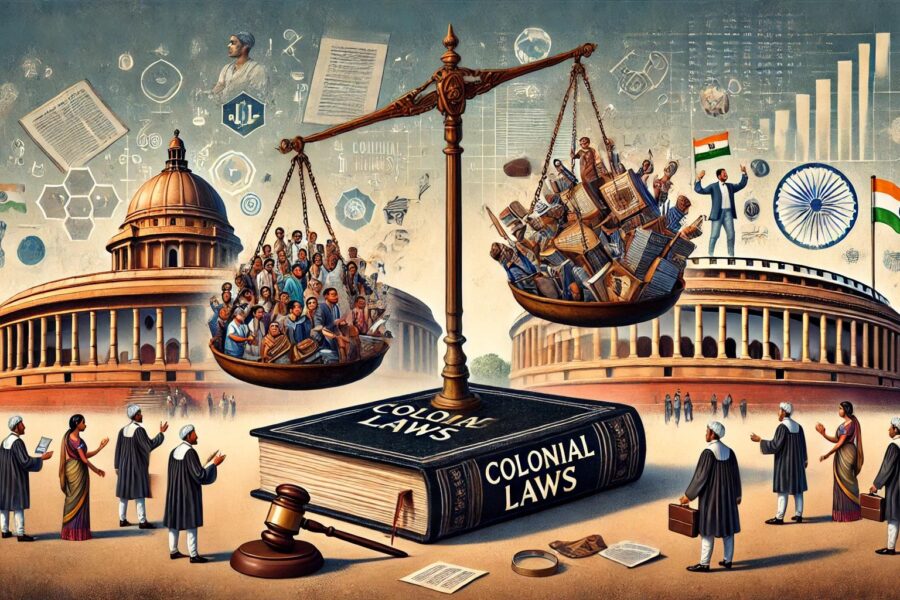Introduction
India’s legal system is vast and intricate, rooted in colonial-era laws and gradually evolving to meet modern needs. However, the need for legal reforms remains a significant challenge. Outdated laws, slow legislative processes, and inconsistencies in legal interpretation continue to hinder the effectiveness of the justice system. This article explores the issues surrounding legal reforms in India and the necessary steps for modernization.
Historical Context of Legal Reforms in India
Legal reforms in India have been an ongoing process since independence. The Indian Constitution, adopted in 1950, laid the foundation for the legal system, ensuring justice, liberty, equality, and fraternity. Over the years, several landmark reforms have taken place, such as the abolition of untouchability, the implementation of the Right to Information Act (2005), and the introduction of the Insolvency and Bankruptcy Code (2016). However, despite these efforts, many outdated laws continue to exist, and the need for systemic changes remains crucial.
Causes of Legal Reform Challenges
Outdated Laws: Many laws in India date back to the British colonial era, such as the Indian Penal Code (1860) and the Evidence Act (1872), which require updates to align with contemporary needs. These archaic laws often do not account for modern technological advancements, socio-political changes, or evolving human rights standards.
Lengthy Legislative Process: The process of drafting, debating, and passing new laws in the Indian Parliament is time-consuming, leading to delays in necessary legal changes. Many legislative proposals get stuck due to political disagreements, bureaucratic red tape, and procedural inefficiencies.
Lack of Political Will: Legal reforms often take a backseat due to political considerations, with governments focusing on immediate electoral gains rather than long-term legal improvements. Politicians may hesitate to push for reforms that could be perceived as unpopular or controversial.
Judicial Interpretations and Overlaps: Conflicting judicial decisions on various laws lead to ambiguity, making legal reforms even more complex. Inconsistent interpretations by different courts contribute to legal uncertainty and prolonged litigation.
Public Awareness and Participation: Many citizens are unaware of their legal rights and the need for reforms, leading to limited public pressure on lawmakers to update archaic laws. Civic engagement in the legislative process remains low, resulting in a lack of accountability.
Implications of Legal Reform Delays
Legal Uncertainty: Outdated laws and conflicting judicial interpretations create confusion in legal proceedings. This legal uncertainty makes it difficult for individuals, businesses, and government institutions to function effectively within the legal framework.
Economic and Social Stagnation: Inadequate legal frameworks slow down economic progress and fail to address pressing social issues like gender equality, environmental protection, and cyber security. Unclear or outdated business laws can deter foreign investment and hinder entrepreneurial growth.
Human Rights Concerns: Laws that do not reflect modern human rights standards can lead to injustices, particularly affecting marginalized communities. For example, the criminalization of homosexuality under Section 377 of the Indian Penal Code was only recently overturned in 2018, highlighting the delayed legal response to evolving societal norms.
Judicial Backlog: The slow process of legal reforms contributes to a massive backlog of cases in Indian courts. With over 40 million pending cases across various levels of the judiciary, timely legal reform is necessary to streamline judicial processes and reduce delays.
Potential Solutions
Systematic Review and Repeal of Archaic Laws: A dedicated legal commission should regularly review and update laws to eliminate outdated provisions. Periodic reviews can ensure that redundant laws do not hinder progress.
Faster Legislative Processes: Streamlining the law-making process through expert committees and public consultations can ensure timely legal reforms. Simplifying bureaucratic procedures and setting deadlines for law-making can expedite reform efforts.
Use of Technology in Lawmaking: Digital platforms can be used for drafting, debating, and gathering public feedback on new legal proposals. Online legal databases and AI-driven analysis can help lawmakers identify gaps and inconsistencies in the legal system.
Judicial Consistency: Encouraging consistency in judicial decisions through clear legal guidelines can reduce ambiguity in legal interpretations. Establishing standardized precedents and guidelines can help judges maintain uniformity in rulings.
Legal Education and Awareness: Increasing awareness of legal rights and reforms among citizens can enhance public participation in legal updates. Schools, universities, and media campaigns can play a significant role in educating people about their rights and the importance of legal reforms.
Alternative Dispute Resolution Mechanisms: Encouraging mediation, arbitration, and other alternative dispute resolution methods can help reduce the burden on courts and provide faster resolutions to legal disputes.
Strengthening the Independence of Judiciary: Ensuring that the judiciary remains independent from political interference can facilitate unbiased decision-making and uphold the rule of law.
The Role of Legal Institutions and Civil Society
Legal institutions, including the Law Commission of India, the Supreme Court, and various legal think tanks, play a crucial role in identifying and advocating for legal reforms. Civil society organizations, NGOs, and activists also contribute by highlighting legal gaps and pushing for policy changes. The collaboration between government agencies and non-state actors is essential for effective legal reform implementation.
Conclusion
Legal reform in India is crucial to ensuring justice, economic growth, and social progress. Addressing the challenges requires a proactive approach by lawmakers, the judiciary, and civil society. A well-structured and modern legal framework will strengthen the rule of law and contribute to the nation’s development in the 21st century. Comprehensive legal reforms, driven by technology, public participation, and institutional support, can create a legal system that is more transparent, efficient, and just for all citizens.

